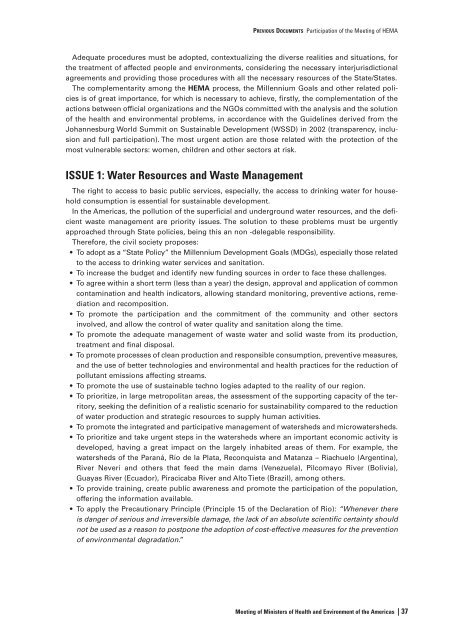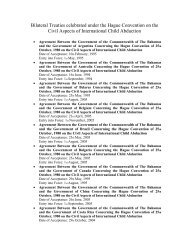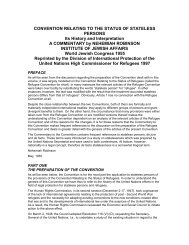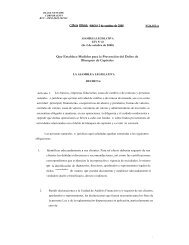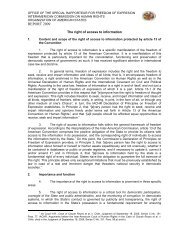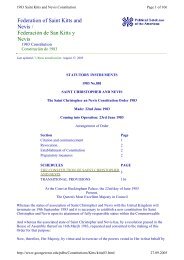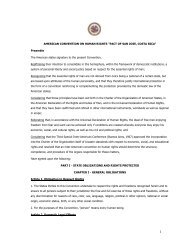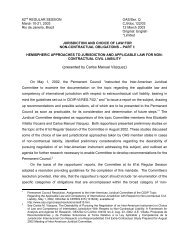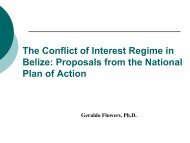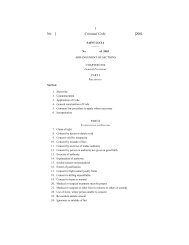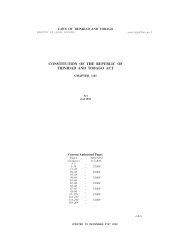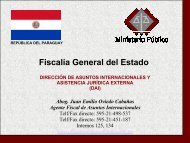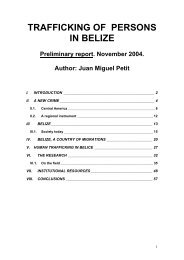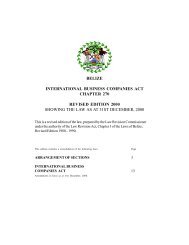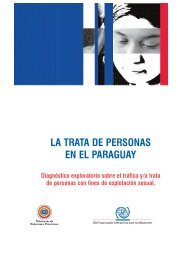(HEMA) Initiative. - OAS
(HEMA) Initiative. - OAS
(HEMA) Initiative. - OAS
You also want an ePaper? Increase the reach of your titles
YUMPU automatically turns print PDFs into web optimized ePapers that Google loves.
PREVIOUS DOCUMENTS Participation of the Meeting of <strong>HEMA</strong><br />
Adequate procedures must be adopted, contextualizing the diverse realities and situations, for<br />
the treatment of affected people and environments, considering the necessary interjurisdictional<br />
agreements and providing those procedures with all the necessary resources of the State/States.<br />
The complementarity among the <strong>HEMA</strong> process, the Millennium Goals and other related policies<br />
is of great importance, for which is necessary to achieve, firstly, the complementation of the<br />
actions between official organizations and the NGOs committed with the analysis and the solution<br />
of the health and environmental problems, in accordance with the Guidelines derived from the<br />
Johannesburg World Summit on Sustainable Development (WSSD) in 2002 (transparency, inclusion<br />
and full participation). The most urgent action are those related with the protection of the<br />
most vulnerable sectors: women, children and other sectors at risk.<br />
ISSUE 1: Water Resources and Waste Management<br />
The right to access to basic public services, especially, the access to drinking water for household<br />
consumption is essential for sustainable development.<br />
In the Americas, the pollution of the superficial and underground water resources, and the deficient<br />
waste management are priority issues. The solution to these problems must be urgently<br />
approached through State policies, being this an non -delegable responsibility.<br />
Therefore, the civil society proposes:<br />
• To adopt as a “State Policy” the Millennium Development Goals (MDGs), especially those related<br />
to the access to drinking water services and sanitation.<br />
• To increase the budget and identify new funding sources in order to face these challenges.<br />
• To agree within a short term (less than a year) the design, approval and application of common<br />
contamination and health indicators, allowing standard monitoring, preventive actions, remediation<br />
and recomposition.<br />
• To promote the participation and the commitment of the community and other sectors<br />
involved, and allow the control of water quality and sanitation along the time.<br />
• To promote the adequate management of waste water and solid waste from its production,<br />
treatment and final disposal.<br />
• To promote processes of clean production and responsible consumption, preventive measures,<br />
and the use of better technologies and environmental and health practices for the reduction of<br />
pollutant emissions affecting streams.<br />
• To promote the use of sustainable techno logies adapted to the reality of our region.<br />
• To prioritize, in large metropolitan areas, the assessment of the supporting capacity of the territory,<br />
seeking the definition of a realistic scenario for sustainability compared to the reduction<br />
of water production and strategic resources to supply human activities.<br />
• To promote the integrated and participative management of watersheds and microwatersheds.<br />
• To prioritize and take urgent steps in the watersheds where an important economic activity is<br />
developed, having a great impact on the largely inhabited areas of them. For example, the<br />
watersheds of the Paraná, Río de la Plata, Reconquista and Matanza – Riachuelo (Argentina),<br />
River Neverí and others that feed the main dams (Venezuela), Pilcomayo River (Bolivia),<br />
Guayas River (Ecuador), Piracicaba River and Alto Tiete (Brazil), among others.<br />
• To provide training, create public awareness and promote the participation of the population,<br />
offering the information available.<br />
• To apply the Precautionary Principle (Principle 15 of the Declaration of Rio): “Whenever there<br />
is danger of serious and irreversible damage, the lack of an absolute scientific certainty should<br />
not be used as a reason to postpone the adoption of cost-effective measures for the prevention<br />
of environmental degradation.”<br />
Meeting of Ministers of Health and Environment of the Americas | 37


